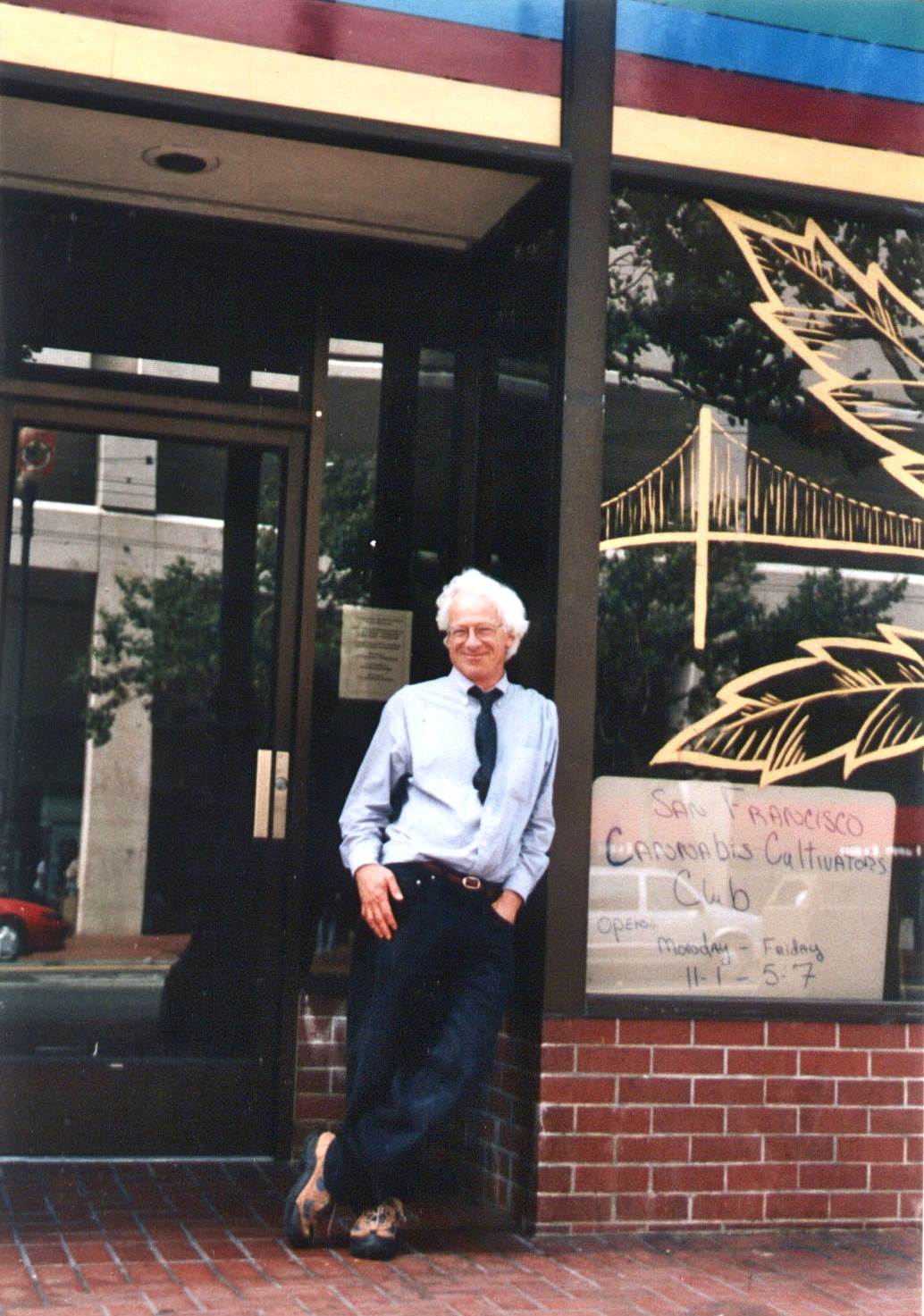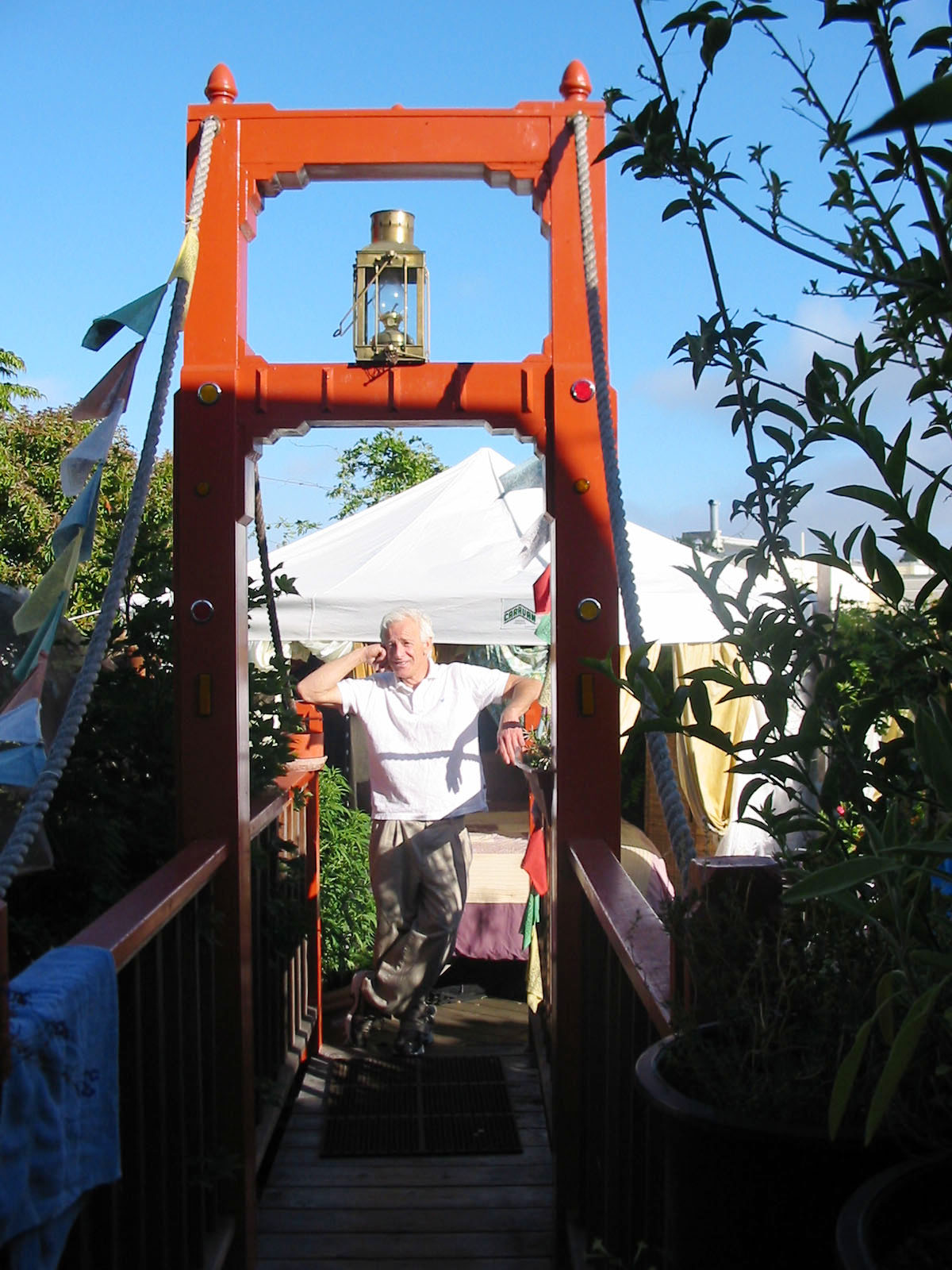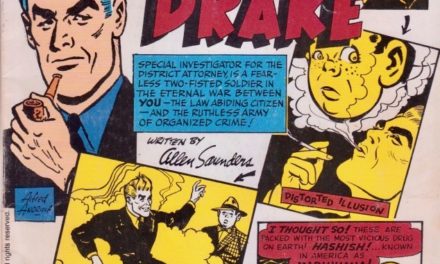Dennis Peron died in January. On Sunday March 11 there was a memorial for him at Café Flor in the Castro. I wrote out a speech but reading it would have taken eight minutes and the organizers requested The Ballad of Dennis Peron, so I condensed the speech (full version below) and rapped the lyric.
Everybody knows that Dennis was a leader in the medical marijuana movement and in the fight for gay rights. Not everybody knows about his role in the peace movement.
After Dennis had been shot in the thigh by a San Francisco narc, he underwent surgery and was laid up for a week at St. Joseph’s hospital, which was up the hill from the Castro, near Buena Vista Park. A beautiful building, long ago converted to condos. This was 40 years ago. I sat at his bedside and took down his story.*
In 1967 Dennis had gotten his draft notice and joined the Air Force —a longer hitch but it guaranteed a non-combat specialty. He was trained as a radio operator and then employed as a clerk. He had smoked marijuana back home in New York but didn’t get into it heavily until he was in training in Biloxi. He had a 30-day leave before shipping out to Vietnam and chose to spend it in San Francisco. 1967 —the so-called “Summer of Love.”
“I rented a room at the Texas Star Hotel, right next to the bus station. From the first time I walked down Haight Street I realized my life would never be the same. I was so happy. Before I left I got into a communal scene, living with about 20 people in this beautiful old house. A lot of people were trying to talk me into deserting —a lot of people— but I’m just not the kind of person who runs away from anything.
“I wasn’t really anti-war until the Tet offensive began. I was stationed at Tan Son Hut [Air Force Base] working as a clerk in the mail terminal. All the mail from the States would come through there and be shipped to all those bases. I made sergeant there. At night we’d go to this house in downtown Saigon that a bunch of us rented for $100 a month—10 GIs, 10 dollars apiece. We used to go there and smoke, that was our big thing. And we’d stay the night, no problem getting back on base.
“We were there playing Scrabble when all of a sudden, at midnight, all hell broke loose, shooting everywhere. Right down the street. Helicopter gunships all over the place, shooting from buildings. I shit in my pants. Couple of us had guns, none of us knew how to use them. They tried to teach me in basic training but I just couldn’t do it. I always just closed my eyes. I had to qualify four times.
“There’s no combat in the Air Force. The only combat we saw was that night, the night of the Tet offensive. The only reason we got back to base was because they had helicopters flying overhead instructing Americans what to do. You had to run down the street. People were shooting at you. Bullets were flying by me, whole strings of them, a few feet away. Very scary! Ducking into alleys to get away from the shooting. There were convoys to the base. They were getting shot at. We all got to a convoy. Couple of busses were being towed by tanks and tractors. Gunships guarding us.
“But even when we made it back, it wasn’t over. There were snipers inside the compound. One on the water tower that was holding down the whole compound, picking off people here and there. The shooting lasted four or five days. It seemed like they had half a million North Vietnamese troops in Saigon. People had been hiding them —actually hiding and cooperating with them. And you can’t say it was through fear or intimidation, that’s too far-fetched.
“I got radicalized during the Tet offensive. I got real anti-war and that’s when the bureaucracy started getting pissed at me. I was kinda refusing to cut my hair at the time, downrapping the war all the time, trying to get my friends to downrap it. Before Tet we were kind of complacent about it. We were stoned, not too involved. But when that happened I said, ‘What the hell are we doing to these people?’ I saw our own gunships killing innocent people. I got so shaken that from then on I was really one of the major agitators at Tan Son Hut… In many ways I’d had that rightwing attitude that we were helping these people, that we were doing a good thing, never really realizing that it was a civil war.”
One of Dennis’s duties had been to stack the body bags that would be flown back to the U.S. He started wearing a black armband. He was transferred to a base in Thailand on the border with Laos.
“The mission at the base was to bomb the Ho Chi Minh Trail. You could see the B52s bombing the trail, through the mountains, and you could feel it. You could feel it as much as seeing it. It would light up the sky. The Ho Chi Minh trail was about 30 miles away from us. I was a major’s clerk.”
Dennis was exposed to Agent Orange and always suspected it had damaged his lungs.
“I learned a lot of phrases and made a lot of friends. I had a beautiful time with the Thai people. I rented a house that had no door, no windows. I got around on a bicycle. I really went native… Sometimes I would have to act as interpreter. My company commander appreciated the community-relations job I was doing. ‘Right on, Sgt. Peron.’
“Many of my GI friends went native, too. I was trying to radicalize as many people as I could. I said, ‘Hey, come on, we can make these people our friends. These people can be our friends for life! I was trying to get as many GIs as possible away from that bar-prostitute scene that was really just set up for them.
“Before I left I went to a beautiful city in the northeast, Chang Mai. I rented a jeep and went up these mountain roads —another half inch and you’re off the mountain. You come into these little villages with the Miao tribespeople all dressed up in their beautiful colorful garb, with their long pipes, just like out of a movie. I saw fields of marijuana that looked as big as all San Francisco, and so high up you were like in the clouds. Fields of Thai weed, the best weed in the world.”
“The people welcomed me, they figured I was a big buyer or something. Who knows what they thought I was? And I did buy five or six pounds.”
I recall him saying it was $50 a pound. He mailed marijuana to friends in the Haight in tape cassette containers. Said he spent more on the tapes than on the weed. He came back with several pounds hidden inside speakers in his duffel bag.
“When I came out of the service I decided to dedicate my life to world peace. Marijuana makes people peaceful. Alcohol makes people violent… I gave away four pounds —gave it to friends and friends of friends, Johnny Appleseed, free grass, free love, free everything. I was still an idealistic hippie. It was the start of 1970 but I thought everything was still like 1967. I was totally bummed out.”
History has been conveyed so that the image of the antiwar movement is peace marchers with signs or students cutting up on campus. The truth is, the heaviest anti-war organizing took place within the military by people doing what Dennis called “downrapping the war.” He was one of the open-minded servicemen and women who came to see that we had taken sides in a civil war. (“We” —the most misused word in the language.) The United States government had taken sides in a civil war. The side of the French, the colonialists.
So, add this to our list of Dennis Peron’s accomplishments: he helped expedite an end to US intervention in Vietnam.
The piece I wrote about him all those years ago ends with a scene from the hospital:
“… He was pressing a joint on a middle-aged nurse. ‘Oh, come on,’ he bantered, ‘I know you want to try it. Just out of curiosity. Here, take it home. Wait till your husband is out somewhere. Open the windows and light up. No one’ll ever know.’
“The nurse looked suspiciously at the joint and asked where it was from. ‘Columbia,’ Dennis said. ‘Where are you from?’
“‘Nicaragua.’ She patted Dennis on the arm and didn’t take the joint. On the way out she turned back to him. ‘I hear it’s very good from Thailand.’
“Dennis beamed. “You want Thai, huh? All right, come back this afternoon around five and I’ll have some for you.'”
The next day he underwent surgery. A rod was inserted where his thigh had been shattered.
* I just scanned in some typed pages from the interview. I had a portable tape recorder and did my own transcribing. This is primary source material for some future historian who recognizes that Dennis was the Rosa Parks of the medical marijuana movement.





